Most new O.D. grads are simply out to make a quick buck, right? They'll leap at the first juicy offer from a corporate optical, wont they? And, they think they should be on Easy Street no matter where they practice, don't they?
Nope. Nope. Nope.
Actually, almost two-thirds of students in the class of 2009 are planning to go into private practice, with the eventual goal of owning or co-owning their own practices. Only a small percentage expect take their first job in a corporate setting (which they generally consider unattractive). And, they have realistic goals and expectations about earnings and debt.
As a matter of fact, more than four out of five new graduates (85%) think that optometry is primarily a profession, not primarily a business.
These are the results of survey conducted by Practice Advancement Associates on behalf of the
In February, a total of 1,200 surveys were mailed to all fourth-year optometry students in the
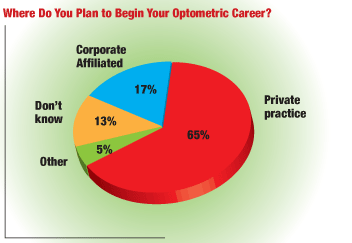
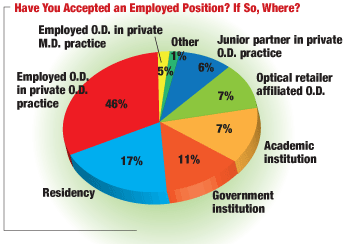
Private Practice in Sight
Immediately after graduation and licensing, as many as 10% of fourth-year students intended to start a private practice, either cold or by purchasing an existing practice. Of these young entrepreneurs, one-fourth had already taken steps to obtain financing.
Of the 2009 graduating class, 65% expect that their first job will be in a private practice setting (whether as an owner or an employed associate). Indeed, as of early April when the survey was taken, as many as half (49%) of the 2009 graduating class already had firm plans for their first working position. Of these, 38% had accepted a job offer about half of them as employed associate O.D.s in private optometric practices.
Thats a very positive number, says Michael Bacigalupi, O.D., M.S., commenting on the study. Dr. Bacigalupi is assistant dean for Student Affairs at Nova Southeastern University College of Optometry. There's a perception that all young O.D.s are going to go into corporate practice, and this number contradicts that perception. According to this survey, 17% of graduates expected to be employed by an optical retailer.
The survey also asked graduates where they expected to be working five years from now. Nine out of 10 (91%) said they expected to be in private practice in one form or another—whether as an owner or co-owner (64%), as an employed O.D. (20%), or as a junior partner (7%).
That's a good thing for O.D. practice owners, Dr. Bacigalupi says. These students are leaving with this long-term goal to own or be a partner in a private practice. That tells us there is going to be a continued market for the sale of private practices in the future.
Only 2% of graduates expect to be working for an optical retailer in five years.
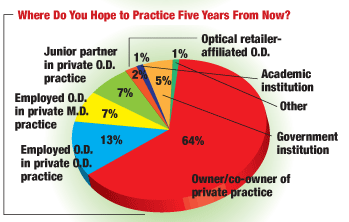
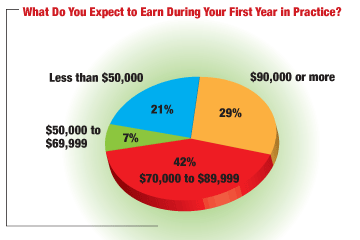
Private vs. Corporate
The survey asked graduating students about their perceptions of working in a private practice setting compared with a retail optical setting. For most aspects of the work and the setting, private practice was strongly preferred. New grads believe that private practice offers:
• Greater independence to practice the way they choose.
• Higher income potential over the long term.
• Greater opportunity to provide full-scope eye care services.
• Ability to spend more time with individual patients.
• A better balance between family and career.
The sole advantage of practice in a corporate setting, they thought, is that it offers higher income potential in the years immediately after graduation.
Do new grads understand what its like to work in corporate optometry? They rated most of the retail chains as unattractive practice locations. Among several that were rated, only LensCrafters and Pearle were determined be more attractive than not. (Specifically, 58% said LensCrafters is a somewhat, very or extremely attractive setting, while 54% said the same about Pearle.)
Practicing at
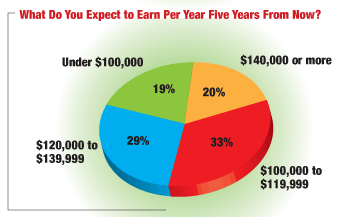

Money Matters
For their first year of work, new graduates expect to earn an average of about $72,500. In five years, they estimate earning an average of about $119,000. While new graduates can sometimes be overly optimistic about what they expect to earn, these are realistic, obtainable numbers, Dr. Bacigalupi says.
Interestingly, female respondents had a lower expectation of their income in five years ($114,700) compared with male respondents ($127,100).
But how much new grads expect to earn is also a factor of how much they owe. Specifically, four out of five (81%) of graduating O.D.s have student debt balances of $100,000 or more. Nearly half (45%) have debt of $150,000 or more.
This matches what Dr. Bacigalupi has seen among optometry graduates at Nova Southeastern. Among Novas graduating class of 2008, the average student debt was $152,410. For the 2009 class, preliminary data shows the mean student debt is going to be about $165,000, he adds.
Results of a survey of fourth-year optometry students found:
10% intend to start a private practice after graduating.
46% who had accepted employment will work in a private O.D. practice.
$72,497 is the average compensation expected for their first year on the job.
$118,986 is the average compensation expected within five years of graduation.
64% expect to be an owner or co-owner of a private practice within five years of graduation.
Male O.D.s are more likely to anticipate being private practice owners after five years than female O.D.s (78% vs. 58%).
45% of all students have debt of $150,000 or more.
What Will New Grads Do?
Good for Clinic, Bad for Business
In general, graduating O.D.s believe they are very well prepared for the clinical aspects of optometry, but not so well prepared for the business aspects. Specifically, students rated their optometry school education as outstanding or very good in preparing them to:
• Provide medical eye care (91%).
• Communicate with patients (78%).
• Recommend contact lens options (73%).
• Recommend spectacle lens options (60%).
However, students judged their education as somewhat or very inadequate in preparing them to:
• Manage support staff (59%).
• Deal with financial aspects of practice (58%).
• Market themselves to potential employers (46%).
• Provide practice leadership (37%).
Optometry schools are aware of this and theyre taking steps to build up business aspects in their curricula, Dr. Bacigalupi says. In the same way that O.D. students receive hands-on clinical training, he says, optometry schools are now trying to give students hands-on business and financial training.

